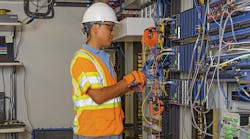We use a variety of approaches to remind us to be safe, including laminating a picture of our family members on the back of our ever-present ID cards. It is an excellent reminder, but often not effective. Perhaps this is because as important as they are to us, they are not working next to us in an excessively hot or cold, cramped environment at odd hours of the day or night. Our crewmates, however, are right there, next to us.
Enhanced and Expanded Duty of Care
For those of us with children, there is no doubt that we deeply love and do everything we can to care for them. I think this may be particularly true for the folks in our industry, despite the time I stupidly ran down a Home Depot aisle with my small son on a lumber cart. After he fell off and split his lip open, I paid the price in the ER. As he was being immobilized for the sutures, he looked at me through his tears and asked, “Why are you letting them do this to me?” It was a tough moment. But, overall, we pay attention to their every move and in nearly all cases, that gets them to 18. However, even this primal level of care is increased when neighbor kids visit our house. We go to an even higher level of vigilance. I make it a point to know when they are there and I know how and when they are safely returned to their own homes. We are horrified by the prospect of someone else’s child being injured while under our care.
This phenomenon provides an opportunity for us to take a fresh perspective at crew performance, dynamics and safety. Do we watch out for our peers – working right there next to us – with the same level of attention we provide children visiting our home? Does preventing an injury to a peer count the same as us personally going home safely? Are we thinking of a “double” safety outcome – I’m safe; You’re safe - each day? Or, do we think, “He knows what he is doing so I am just going to stay quiet?” Perhaps we’ve thought, “I wouldn’t do it that way but he is a qualified journeyman/electrician/technician and it is his/her call.” Or, “He is responsible for his safety and I am responsible for my safety.” This line of thinking is even easier when you’ve just met them and don’t know their normal approach to work.
There are many instances of a work colleague pledging to a friend’s spouse that they will keep an eye on each other on the job. Of course, this is not possible unless they are on the same crew. But, the sentiment can and should hold true for all employee groups and crews.
Moral Courage and Obligation
As we continue to grapple with the challenges of working safely as a crew, we can begin to consider watching over our peers a privilege and a moral obligation. We can start to think that it would be an embarrassing breach of honor if my peer was injured. And, of course, this would also require that we exhibit an open spirit and receptivity to the safety concerns of others about our own behavior. It is a two-way street. “Not on my watch,” can easily be rewritten on the hearts of each person, “Not on My Crew, Not Today.”
The players on the best baseball teams routinely “back up” each other, for example, when the pitcher backs up the first baseman in a pickle situation. The best crew members take the safety of the crewmates – even those they may hardly know – as seriously as they do their own safety. They don’t leave the job site, get distracted, check their phone or in any manner “check out” or excuse the tedious and tiring act of constantly paying attention.
To take “You are Your Brother’s Keeper” seriously means to think in terms of moral courage and obligation. Heady stuff to be sure, but so is dying. The former deserves no small measure of the latter.
In Learning,
Tom


